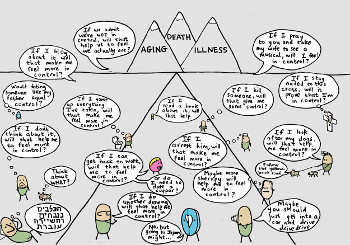Keeping Sane in the Current Environment
 Starting-Over-Again“I would like to run away from my life”.
Starting-Over-Again“I would like to run away from my life”.
That was how one client described her state of mind when we met. A combination of personal and business upsets meant that the past year had been really tough and it all seemed overwhelming. Her suggestion about the way forward was a fairly common fantasy; abandon everything and start over. I told her that there would be a long queue if that option actually existed.
Against the Tide:
Consider the guy who signs up for a fitness regime. He hits the pool on Monday, Wednesday and Friday and runs on a couple of the other days. After 6 months he stands on the weighting scales to discover that he’s put on three pounds! When you swim against the economic tide, winning can seem impossible. Virulent competition, mind-numbing regulation or any number of other hassles can seem insurmountable. In the current environment it’s difficult to feel good about your managerial skills or even to maintain confidence. But context is everything. While anyone can steer the boat when the sea is calm, it takes an incredible sailor to weather a storm. And, without doubt, we’re coming through the biggest economic storm this country has ever witnessed. If your business is still alive and kicking that’s an achievement. However, when brutal business conditions coincide with a personal crisis, then you have all the elements for a Perfect Storm. And that’s exactly where this particular client found herself.
Fight or Flight?
Many of us have entertained the idea of ‘flight’. We could spend the rest of our days simmering prawns on the Phi Phi Islands in Thailand or working as a *Realtor in southern California. Yes, just dial Aer Lingus and top up that tan. The reality is that during the recession it’s difficult to keep mentally afloat as we are constantly bombarded by negativity and sometimes feel stuck with the life we have. “Ireland forfeits economic independence”; “Double dip recession forecast”; “Longest downturn in modern history” scream out from every media source.
So, if you plumb the depths of despair to the point that you would really like to start all over again, is there anything you can actually do? Here are a couple of simple (not simplistic) steps that just might make sense:
1. Surviving:
Depending on the depth of the issues faced, some people need to talk to their GP/medial Consultant and get some short-term pharmaceutical support. We tend to think of suicide as a teenage phenomenon – but some recent high profile cases have shown this stereotype to be wide of the mark. Where the mental pain is acute, you may need some short-term support (even if you don’t ‘see yourself’ as the type of person who relies on tranquilizers or anti-depressants to get through life). As a child, walking past Grangegorman Mental Hospital, I asked my mother about the high walls. She replied: “That’s to keep all the mad people out of there”. We all need support from time to time. Don’t be afraid to shout for help.
2. Coping:
If the presenting issues are immediate, there is often a need for a short-term coping strategy to ‘get beyond the impasse’. For example, when a range of concerns become jumbled (“I don’t like my wife”; “the kids are underperforming”; “I’m drinking too much”; “My career is going nowhere”) it can be useful to group these and come up with some short-term priority actions. Not everything needs to be sorted today. It’s like the old question: “How do you eat an elephant”? (“One bite at a time”).
3. Support:
 It used to be that talking to a counsellor was seen as sign of weakness – a half-step towards a formal admission of mental instability. If ‘real men don’t eat quiche’, then they certainly don’t visit psychotherapists for the talking cure. Executives, both men and women, typically don’t see themselves as ‘needy’ or dependant. But this viewpoint is based on a misnomer. Mental health problems are often best understood as temporary aberrations. If you broke your arm playing tennis there would be zero problem going to the A&E Department to have the bone re-set. In similar vein, sometimes you need a ‘mental re-set’. Don’t be afraid to seek professional support. Spending money on your mental health can be a solid investment. Embrace that L’Oreal tagline: ‘Because you’re worth it’. It’s cheaper and more effective than making best friends with a line of white powder or Captain Morgan.
It used to be that talking to a counsellor was seen as sign of weakness – a half-step towards a formal admission of mental instability. If ‘real men don’t eat quiche’, then they certainly don’t visit psychotherapists for the talking cure. Executives, both men and women, typically don’t see themselves as ‘needy’ or dependant. But this viewpoint is based on a misnomer. Mental health problems are often best understood as temporary aberrations. If you broke your arm playing tennis there would be zero problem going to the A&E Department to have the bone re-set. In similar vein, sometimes you need a ‘mental re-set’. Don’t be afraid to seek professional support. Spending money on your mental health can be a solid investment. Embrace that L’Oreal tagline: ‘Because you’re worth it’. It’s cheaper and more effective than making best friends with a line of white powder or Captain Morgan.
4. Thriving:
 Longer term, it’s definitely useful to have a ‘life plan’ with something broader to aim towards. When the immediate presenting issues have been dealt with, you can begin to look further out the road. Perhaps learn something from the Chinese philosophy which suggests that there are three central elements to happiness (1) Something to do (2) Someone to love (3) Something to look forward to. But you can only get into this ‘swamp draining’ arena, when the crocodiles have been shot! Unfortunately, you can’t skip to Step 4 if the earlier issues are not ‘sorted’.
Longer term, it’s definitely useful to have a ‘life plan’ with something broader to aim towards. When the immediate presenting issues have been dealt with, you can begin to look further out the road. Perhaps learn something from the Chinese philosophy which suggests that there are three central elements to happiness (1) Something to do (2) Someone to love (3) Something to look forward to. But you can only get into this ‘swamp draining’ arena, when the crocodiles have been shot! Unfortunately, you can’t skip to Step 4 if the earlier issues are not ‘sorted’.
Does it work?
 earned helplessnessNo, not always. Sometimes clients are too busy to be helped or become paralyzed by the problems faced. All you can do is offer support by being there (in the case of friends, doing something ‘nice’ for them without actually intervening can help). Dropping down the gears is the classic sign of depression. Clients who present with depression often have little appetite for life, their energy depleted. It can all seem a bit pointless. Example: when people become unemployed you might anticipate opportunities to paint the house from floor to ceiling, run the marathon or take up night classes. In practice, many people find that it’s a period in their life when they are actually less productive than when they were working full-time.
earned helplessnessNo, not always. Sometimes clients are too busy to be helped or become paralyzed by the problems faced. All you can do is offer support by being there (in the case of friends, doing something ‘nice’ for them without actually intervening can help). Dropping down the gears is the classic sign of depression. Clients who present with depression often have little appetite for life, their energy depleted. It can all seem a bit pointless. Example: when people become unemployed you might anticipate opportunities to paint the house from floor to ceiling, run the marathon or take up night classes. In practice, many people find that it’s a period in their life when they are actually less productive than when they were working full-time.
In a small number of cases, people have been unhappy for so long that they begin to embrace the ‘victim’ role. To use the jargon, they suffer from ‘learned helplessness’ i.e. they are happy being unhappy (one counsellor described it, perhaps a bit cruelly, as follows: “Some of my clients have become addicted to their own misery”). Facing terrible life problems can actually make people feel important or they have been in the victim space for so long they can’t seem to escape. Either way, they impose a terrible burden on themselves by not addressing the issues faced. Thankfully, this is a minority sport.
Moving Forward:
Most people want to get back to ‘normal functioning’ in their lives and tackle the problems faced. If you can relate to any of the descriptions outlined above, take the decision to do something about it. You are the CEO of your own life. That’s the good news. But it also contains the seeds of personal responsibility i.e. you own your own happiness. If you are struggling to make that happen, looking for support is not a sign of weakness, it actually shows maturity and strength.
* A real estate professional who is a member of the NATIONAL ASSOCIATION OF REALTORS
 Paul MooneyBy Paul Mooney (PHD)
Paul MooneyBy Paul Mooney (PHD)
Mob: 00353 (0) 872439019
E-mail: This email address is being protected from spambots. You need JavaScript enabled to view it." mce_' + path + '\'' + prefix + ':' + addy78884 + '\'>'+addy_text78884+'<\/a>';
//-->
Follow us on Twitter - @DigiPrintNews
Like us on Facebook at www.facebook.com/dpnlive


























